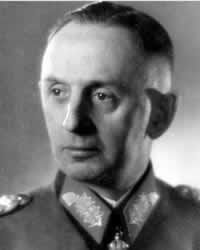Thomas Georg
 Georg Thomas (20 February 1890 — 29 December 1946) was a German general and a resistance fighter in the Third Reich. He was also heavily involved in the planning and
carrying out of the economic exploitation of the Soviet Union, including in particular the Hunger Plan. Thomas was born in Forst (Lausitz), Brandenburg. The factory owner's son and later general
joined Infantry Regiment 63 as an ensign and a career soldier in 1908.
Georg Thomas (20 February 1890 — 29 December 1946) was a German general and a resistance fighter in the Third Reich. He was also heavily involved in the planning and
carrying out of the economic exploitation of the Soviet Union, including in particular the Hunger Plan. Thomas was born in Forst (Lausitz), Brandenburg. The factory owner's son and later general
joined Infantry Regiment 63 as an ensign and a career soldier in 1908.
From 1928, he dealt with armament questions at the Army Weapons Office in the Reich Defence Ministry in Berlin. In 1939, he became head of the Defence Economy and Armament Office in the
Oberkommando der Wehrmacht. He was a member of the board of Kontinentale Öl AG (an oil company whose purpose was to exploit petroleum resources in occupied countries) as well as Reichswerke
Hermann Göring, a major iron and steel company.
Thomas, who since 1940 had been a General of Infantry recognized early on that Germany's ability to wage a lengthy war was limited by the state of its economy. Since he still had contacts with
his former superior Ludwig Beck, as well as with Carl Friedrich Goerdeler and Johannes Popitz, he got to work as early as 1938-39 on the planning for a military coup d'état against Adolf Hitler.
In November 1942, Thomas resigned from the Defence Economy and Armament Office. Albert Speer and his Armament Ministry, meanwhile, had taken over almost all the expertise relating to armament
issues.
After the failed attempt on Hitler's life at the Wolf's Lair in East Prussia on 20 July 1944, all the old plans from 1938-39 were found, leading to Thomas's arrest on 11 October 1944, followed by
stays in the Flossenbürg and Dachau concentration camps. In late April 1945 he was transferred to Tyrol together with about 140 other prominent inmates, where the SS left the prisoners behind.
They were liberated by the Fifth U.S. Army on May 5, 1945.
Thomas has been described as someone who at times "toyed with opposition to Hitler's war" but who fundamentally was a "ruthless pragmatist" whose only concern was "Germany's future as a great
power." As such he was deeply involved in the crafting of Nazi policy for the occupied Soviet Union, which in short was designed to exploit the entire resources of the country for the benefit of
Germany and the German armed forces, at the expense of the deaths by starvation of millions of people. This became known as the Hunger Plan. Thomas worked closing with Herbert Backe, the de facto
chief of Nazi agriculture, in developing this plan. In the course of this, on 2 May 1941, Thomas held a high level meeting to review the strategy.
An internal Wehrmacht memorandum prepared by his staff described this policy and acknowledged that "'if we take what we need out of the country, there can be no doubt that many millions of people
will die of starvation.'" This memorandum has been described as : ...one of the most extraordinary bureaucratic records in the history of the Nazi regime. In far more unvarnished language than
was ever used in relation to the Jewish question, all of the major agencies of the German state agreed to a programme of mass murder, which dwarfed that which Heydrich was to propose to the
Wannsee meeting nine months later.
The German historian Hans-Ulrich Wehler thinks: „Georg Thomas [...] accepted as a consequence of this strategy of warfare that x million people will starve there.“ While the memorandum did not
estimate how many millions would die, Backe himself stated that the "surplus population" of the Soviet Union was 20 to 30 million. German policy for the invasion, and instructions to the troops,
were deliberately calculated either to kill these 20 to 30 million through starvation, or force them to flee to Siberia.
